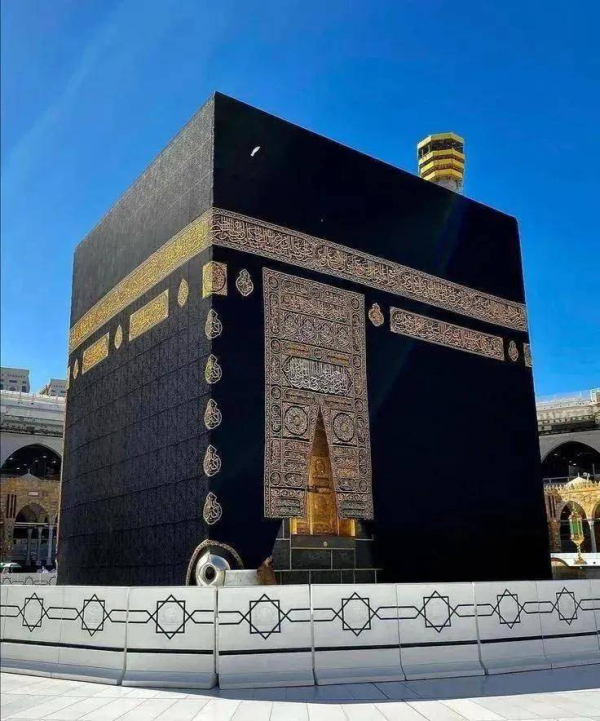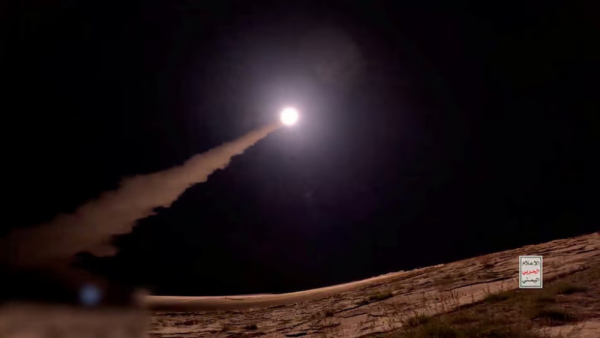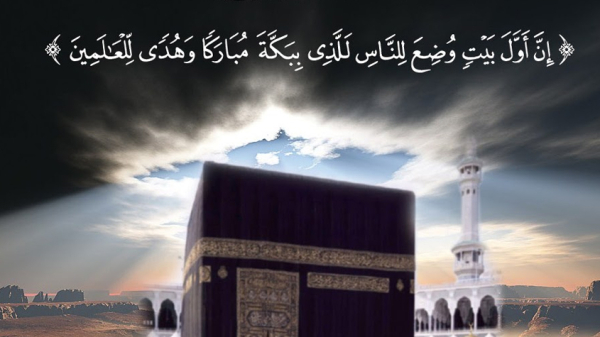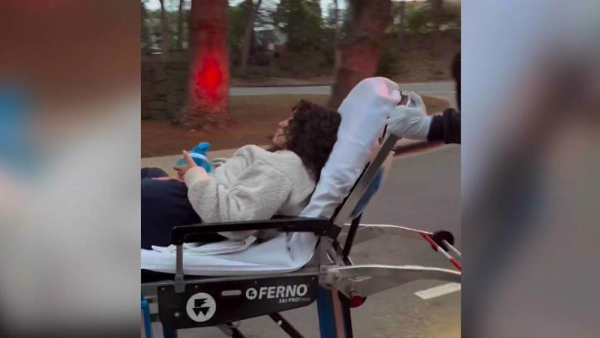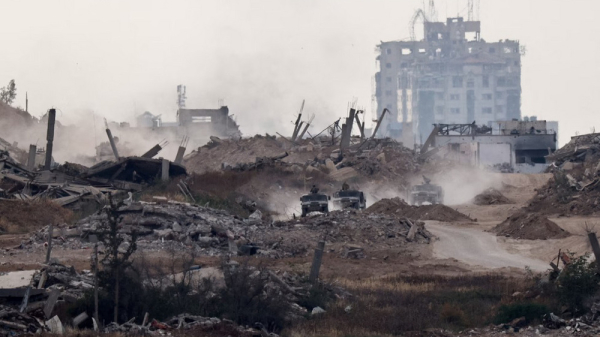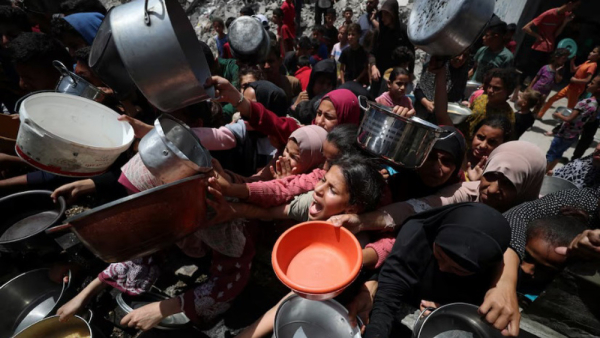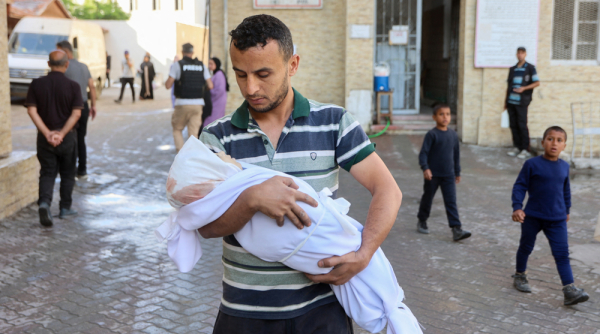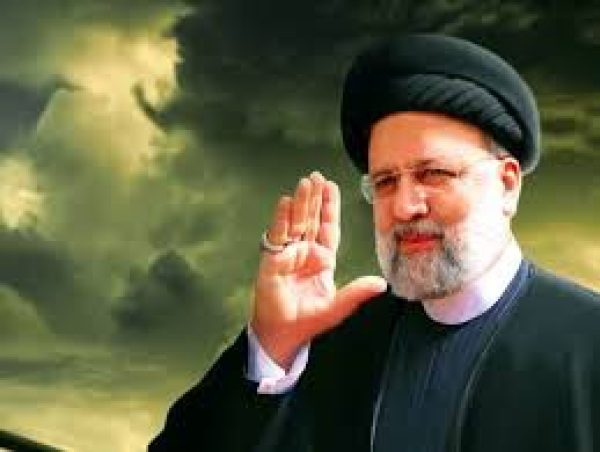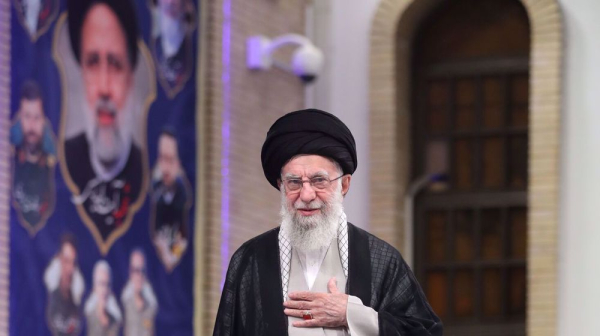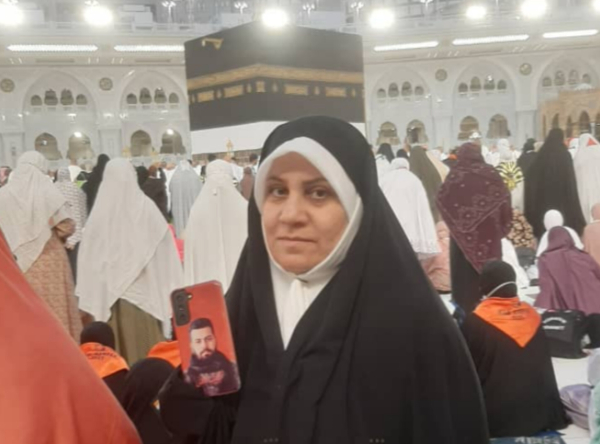zarezadeh
The Day of Dahwal-e-Ard
?Hasan bin Washa’ says:
I was a young man with my father and we had dinner in the presence of Imam Reza (a.s.) on the night of 25th Dhul-Qa’dah.
?The Imam turned to us and said:
? The night of 25th Dhul-Qa’dah; on which Abraham, the son of Khalil, and Jesus, the son of Mary, were born, and the earth spread out from under the Kaaba.
? So whoever fasts on this day is like one who has fasted for sixty months.
? Man la yahdrah al-Faqih, vol. 2, p. 89
•┈┈•• ✾••┈┈•
Sirens blare in Israeli-occupied lands as Yemen launches fresh missile attack
The Israeli military says a ballistic missile fired from Yemen activated sirens in the central region of the Israeli-occupied territories, as the Yemeni Armed Forces continue their operations in solidarity with Palestinians facing a genocidal Israeli onslaught in the Gaza Strip.
In a statement, the Israeli army confirmed that air raid sirens were triggered in Tel Aviv and other locations across central occupied lands, on Friday morning, warning of incoming rocket fire.
The military went on to claim that its anti-air missile systems intercepted the projectile.
Israel's Magen David Adom (MDA) emergency response service said it has yet to receive any reports of injuries.
In a statement, the Yemeni Armed forces said they "carried out a specific military operation targeting Lod Airport, Israeli named 'Ben Gurion', in the occupied area of Yaffa, using a hypersonic ballistic missile".
"The operation has successfully achieved its objective, causing millions of herds of usurping Zionists to flee to shelters and halting airport operations," the statement said.
"Our operations are ongoing and will escalate, with Allah's help and reliance on Allah, until the aggression against Gaza stops and the siege is lifted," it added.
The operation came just hours after the Yemeni Armed Forces announced a missile attack targeting the Ben Gurion Airport, followed by another strike at noon aimed at occupied territories.
Brigadier General Yahya Saree, spokesperson for Yemen’s Armed Forces, confirmed the pre-dawn missile attack in a televised statement aired by al-Masirah TV.
Saree also claimed responsibility for two additional drone attacks, stating that one targeted a “vital target” in Tel Aviv and the other struck at a “vital target” in Haifa.
He stressed that Yemeni forces would continue launching more retaliatory attacks against the Israeli regime if the offensive and blockade against Palestinians in the Gaza Strip continues.
As the genocidal war on Gaza escalated, the Yemenis enacted a strategic blockade on essential maritime routes, with the goal of obstructing the delivery of military supplies to Israel. The move also served as a call to the international community to intervene in the worsening humanitarian catastrophe in Gaza.
The Yemeni military has reiterated its commitment to continue its operations until Israel halts its brutal ground and aerial offensives in the besieged Palestinian enclave.
Press TV’s website
Mecca, the First House on Earth
The first House (of worship) appointed for men was that at Bakka, Full of blessing and of guidance for all kinds of beings.
One of the objections of the Children of Israel was why Muslims, considering the antiquity of Bayt al-Maqdis, which was built by Prophet Solomon a thousand years before Christ, have set it aside and made the Kaaba their Qibla. This verse answers them: The Kaaba has been the first house of worship since the earliest times, and its antiquity is greater than any other place.
UCLA student hospitalized during hunger strike for Gaza
A hunger-striking student at the University of California, Los Angeles (UCLA) has been hospitalized on the ninth day of her protest action, as hunger strikes in solidarity with Palestinians in the besieged Gaza Strip continue across campuses in the United States.
Maya Abdullah, one of the participants in the hunger strike protests against the Israeli blockade on Gaza, was rushed to the hospital on May 18 after she fainted on the ninth day of her hunger strike, while seeking to pressure UCLA to divest from Israel.
“On day nine of my hunger strike, I unexpectedly passed out at my school and had to be rushed to the hospital,” Abdullah said in a video on Instagram.
The 23-year-old Palestinian Lebanese film student went on to say that UCLA administration did not respond to notice of her hospitalization, adding that being hospitalized and not having a conversation with the administration was “disheartening.”
However, Abdullah said she believes her journey was “a step towards divestment” as well as “a bunch of many different things.”
Following the incident, a video of the protesting students also emerged online, where they are blaming UCLA for Maya's hospitalization. The video starts with the words, "This is what happens when UCLA ignores its students. This is on you, UCLA."
Maya Abdullah is one of the growing group of students at universities across the US who’ve launched hunger strikes amid the Israeli blockade on Gaza to demand their schools divest from Israel and protect free speech on campus.
Hunger strikes are ongoing at Yale, Stanford and at California State University schools as Palestinians in Gaza face a humanitarian catastrophe.
The latest development comes as the administration of US President Donald Trump also fights to deport students who support the Palestinian people.
In some cases, international students have been forced to leave the country after university sanctions prevented them from meeting their student visa requirements.
Press TV’s website
Israeli ideologues call for elimination of Gazans 'from infant to elder'
An Israeli settler living in the illegal Shiloh settlement in the occupied West Bank has publicly advocated for the complete annihilation of Palestinians in Gaza.
Rivka Lafair, who identifies herself as a “proud Jew”, has openly expressed her desire to eradicate Palestinians in Gaza from existence, Israeli daily newspaper Haaretz reported.
She is reportedly associated with the ‘YogiNazis’ trend, a marginal movement that merges spiritual practices with Nazi ideology. The group, although relatively recent, represents a deeply entrenched subculture in the Israeli-occupied territories.
Lafair rose to fame for publicly speaking to her audience on annihilating and expelling Gaza’s population, especially after the onset of Israel’s genocidal war against Gaza on October 7, 2023.
She seemingly merged opposing ideas like spirituality and genocide, empowerment and displacement, yoga and starvation, as well as solitude and overwhelming bombardment, according to the report.
She has said that the genocide and forced displacement of Gaza's inhabitants commence with “shifting human awareness”.
“To succeed in this important epistemic shift,” Lafair is quoted as saying, “we must recognize that we have an enemy, look them in the eye, and eliminate them. Do not do this behind their backs; we must have direct, unmediated contact with those we eliminate.”
Haaretz highlighted that Lafair’s provocative remarks did not refer solely to fighters from the Hamas resistance movement. She is reported to have said, “We are committed to revenge and to destroying Gaza - from the infant to the elder.”
Since the start of the atrocious military campaign in Gaza by the occupying Tel Aviv regime in October 2023, there has been a notable increase in public incitement by Israeli political, religious, and military leaders. They have called to starve the population of Gaza and to "flatten" the region, and even made suggestions to forcibly relocate Palestinians to Egypt's Sinai Peninsula.
On Tuesday, Moshe Feiglin, a former member of the Israeli parliament (Knesset ) and affiliated with prime minister Benjamin Netanyahu's Likud Party, openly advocated for the extermination of Palestinian children in Gaza, labeling them as “enemies.”
In an interview with Israel’s far-right Channel 14, Feiglin said, “Every child, every infant in Gaza is an enemy.”
He went on to justify the rhetoric by claiming, “Every child you’re giving milk to today will slaughter your children in 15 years. Gaza must be occupied and settled.”
At least 53,573 Palestinians have been killed, mostly women and children, and another 121,688 individuals injured in the brutal Israeli military onslaught on Gaza since October 7, 2023.
The International Criminal Court issued arrest warrants last November for Israeli prime minister Benjamin Netanyahu and former minister of military affairs Yoav Gallant, citing war crimes and crimes against humanity in Gaza.
Israel also faces a genocide case at the International Court of Justice for its war on the besieged coastal territory.
Press TV’s website
26 Palestinians starved to death in Gaza over past 24 hours, says Euro-Med Monitor
An international human rights organization says at least 26 Palestinians, among them 9 children, have succumbed to starvation and inadequate medical assistance in the besieged Gaza Strip over the past 24 hours.
The Euro-Med Human Rights Monitor said on Tuesday that the dramatic rise in fatalities among the elderly, patients, and children is attributed to the lethal living conditions intentionally enforced by the Tel Aviv regime, with the objective of weakening and harming the population.
These conditions, the Geneva-based organization said, include deliberate starvation, severe suffering, and systematic denial of medical care, in addition to the ongoing comprehensive blockade.
The Euro-Med highlighted that the lack of a robust monitoring system within Gaza's Ministry of Health has led to numerous deaths being classified as natural causes, even though they could have been prevented.
The human rights organization’s field team recorded distressing accounts from elderly individuals, who were forcibly displaced in recent hours and are experiencing hunger.
The Euro-Med also cautioned that ongoing displacement due to intense bombardment is exacerbating the hunger crisis, causing residents to lose their minimal reserves of canned food, if they possess any.
It characterized the humanitarian situation in Gaza as catastrophic, with hunger impacting all sectors of the population.
The Euro-Med urged all nations to fulfill their legal obligations and take prompt measures to halt the ongoing genocide in the Gaza Strip.
The organization finally called upon the global community to implement economic, diplomatic, and military sanctions against Israel due to its ongoing and serious breaches of international law.
The Israeli military resumed bombardment of Gaza on March 18, killing thousands of Palestinians, and injuring many others, after it shattered the 2-month ceasefire agreement with the Palestinian group Hamas and the deal on the exchange of Israeli captives with Palestinian abductees.
At least 53,573 Palestinians have been killed, mostly women and children, and another 121,688 individuals injured in the brutal Israeli military onslaught on Gaza since October 7, 2023.
The International Criminal Court issued arrest warrants last November for Israeli prime minister Benjamin Netanyahu and former minister of military affairs Yoav Gallant, citing war crimes and crimes against humanity in Gaza.
Israel also faces a genocide case at the International Court of Justice for its war on the besieged coastal territory.
Press TV’s website
Scores killed in new Israeli strikes as starving Gazans wait for aid
Gaza health officials say Israeli airstrikes overnight through Wednesday killed at least 52 people, among them multiple women and a newborn baby.
In Khan Younis, where Israel recently issued fresh evacuation orders ahead of an anticipated ground onslaught, 24 Palestinians were killed, including 14 members of a single family.
In central Gaza, a newborn infant was among those killed in the bombardment.
The fresh bout of massacres came as Gazans waited desperately for vital supplies after Israel falsely said it let in dozens of UN trucks.
The Doctors Without Borders (MSF) aid group said the amount of aid Israel has started to allow into the war-ravaged Gaza Strip is not nearly enough and is "a smokescreen to pretend the siege is over".
"The Israeli authorities' decision to allow a ridiculously inadequate amount of aid into Gaza after months of an air-tight siege signals their intention to avoid the accusation of starving people in Gaza, while in fact keeping them barely surviving," said Pascale Coissard, the MSF's emergency coordinator in Khan Yunis.
UN spokesperson Stéphane Dujarric noted that while aid had crossed into Gaza, logistical delays—including Israeli-mandated truck transfers and time constraints—prevented workers from delivering it to distribution centers.
EU foreign affairs chief Kaja Kallas said on Tuesday that "a strong majority" of foreign ministers from the 27-nation bloc backed the move to review its trade cooperation with Israel.
Sweden said it would press the EU to impose sanctions on Israeli ministers.
Britain suspended free-trade negotiations with Israel, summoned the Israeli ambassador and said it was imposing sanctions on settlers in the occupied West Bank in its toughest actions so far against Israel's conduct of the war.
The Israeli military stepped up its onslaught at the weekend, vowing to defeat the Hamas resistance movement.
Footage of southern Gaza from the Israeli side showed multiple strikes throughout Wednesday morning.
In Khan Yunis, distraught relatives cried as their family members were brought to the city's Nasser Hospital following a strike.
The latest bombardment continues Israel’s unrelenting military campaign in Gaza, even as global criticism mounts over its expanding offensive.
Israel launched the campaign of genocide in Gaza on October 7, 2023. It has killed more than 54,000 Palestinians there so far, according to the health ministry of Gaza.
In January, the Israeli regime was forced to agree to a ceasefire deal with Hamas given the regime’s failure to achieve any of its objectives, including the “elimination” of the Palestinian resistance movement or the release of captives.
The 42-day stage of the truce, which was marred by repeated Israeli violations, expired on March 1, but Israel is refraining from stepping into talks for the second stage of the agreement.
On March 18, the regime resumed the strikes on Gaza, breaking the nearly two-month-long ceasefire.
At least 53,573 Palestinians have been killed, mostly women and children, and another 121,688 individuals injured in the brutal Israeli military onslaught on Gaza since October 7, 2023.
Press TV’s website
A life in service: The legacy of Martyr Raeisi in the words of his daughter Reyhaneh Sadat
By Humaira Ahad
Tucked away in the quiet, serpentine alleys of Mashhad, the modest home of the late Iranian President Ebrahim Raeisi’s mother whispers of a family deeply tethered to the people.
Even his own residence, set within a humble Tehran neighborhood, betrays no hint of power's extravagance—no security detail and no ornate symbols of power or privilege.
The setting speaks volumes—a testament to a leader who refused to let the trappings of power distance him from his humble origins. He lived a life marked by simplicity and austerity.
Raeisi’s life stood as an eloquent testament that true dignity does not come from power or grandeur, but from the strength of remaining rooted and being at the service of people.
Born in 1960 in the holy city of Mashhad, home to the magnificent shrine of the eighth Shia Imam, Ali ibn Musa Reza (AS), Raeisi was nurtured in an atmosphere steeped in faith and tradition.
He pursued his scholarly path at the seminary in Qom, a cradle of Islamic learning where towering figures—among them the Leader of the Islamic Revolution, Ayatollah Sayyed Ali Khamenei—shaped his intellectual and spiritual growth.
From a young age, Raeisi was captivated by the revolutionary vision of Imam Khomeini, the founder of the Islamic Republic, whose teachings left an indelible mark on his consciousness.
Those close to him often recall how thoroughly Raeisi had internalized Imam Khomeini’s message: a vision grounded in justice, reason, spirituality, ethics, and the inherent dignity of every human being.
That ideological foundation would later become the compass by which he steered his unwavering support for the oppressed of the world and those resisting the oppression, and the lens through which he forged the policies of his presidency.
Deep faith in the Islamic Revolution
Throughout his presidency, Raeisi anchored Iran’s foreign policy in the principle of defa-al-mostazafin—the defense of the oppressed—a doctrine deeply embedded in Imam Khomeini’s revolutionary ideology.
For Raeisi, this was far more than a political choice; it was a spiritual and universal human mandate.
“Supporting the oppressed is not merely a political stance, it is a Quranic imperative,” he declared in a historic speech at the United Nations General Assembly in September 2023, just weeks before the Al Aqsa Storm operation.
“In the field of resistance, he strongly defended military, economic, and cultural support for the liberation movements. He was the voice of the oppressed Muslims worldwide," said Reyhaneh Sadat Raeisi, the late president's daughter, in an exclusive interview with the Press TV website.
"His stance was evident in his courageous speeches in Russia’s State Duma and at the United Nations.”
Sadat emphasized her late father’s profound sense of duty toward oppressed Muslims worldwide.
“He saw himself responsible, like a father, for every incident in the Islamic world. He considered himself the guardian of situations like what happened in Gaza in particular," she said.
Throughout his leadership, Raeisi was distinguished by his consistent advocacy for oppressed people, always endeavoring to uphold the revolutionary tenets of the Islamic Republic.
Under his administration, Iran amplified its moral commitment to marginalized groups. Analysts note that Raeisi’s vision transcended geopolitics, grounded in an unwavering commitment to social justice.
His prior role as Iran’s judiciary chief had only deepened his belief in governance driven by fairness and integrity, which was praised by all and sundry.
For Raeisi, supporting the mostazafin—the downtrodden—was not a diplomatic maneuver but a sacred responsibility. His unwavering support for resistance movements in Palestine, Lebanon, Yemen, and Iraq was a reflection of this principle.
“The Islamic Republic’s government during the time of the honourable martyr paid special attention to assisting others and sent the first aid shipments to Gaza. Of course, when the passageways were closed, many supplies from the Red Crescent that had been sent were blocked, as the pathways were restricted," Sadat said, speaking about Raeisi’s unflinching dedication to the Palestinian cause.
The late Iranian president's support for the oppressed was not confined to his presidency alone. He was always the voice of the oppressed and voiceless.
“Even at other times, when he (Raeisi) was the custodian of Astan Quds Razavi (2016–2019), he utilized his role to provide structural support for the resistance and sometimes even turned the circumstances in favour of the resistance,” Sadat told the Press TV website.
Championing the Palestinian cause
To Raeisi, Palestine symbolized the most glaring case of global injustice, and the struggle of its people embodied the essence of human dignity. “Resistance is a right, and submission to tyranny, a betrayal of faith,” Raeisi would often assert.
In the aftermath of the events of October 7, 2023, and the Al-Aqsa Storm operation launched by the Palestinian resistance group Hamas, Raeisi extended unwavering support to them.
“The Al-Aqsa Storm operation was a major security, military, and intelligence failure for the Zionist regime,” he stated during a cabinet meeting on October 8.
In subsequent speeches, he hailed the operation as a defining moment in regional history—one that dismantled the illusion of the Zionist regime’s perceived invincibility.
He believed the operation would breathe new life into the resistance and ignite the spirit of defiance in future generations of the campaigners of truth and justice.
“There is no other way but to resist Israel,” Raeisi declared during a November 2023 emergency summit in Riyadh, where he commended Hamas for its retaliatory operations.
He emphasized that resistance transcended individuals or factions—it was a force embedded in the soul and blood of the Palestinian people, a flame that could not be extinguished.
During meetings with media outlets and foreign dignitaries in late 2023, Raeisi emphasized that the Palestinian issue had evolved beyond a regional or religious concern.
He cast it as a universal humanitarian crisis, noting how the growing awareness of Gaza’s plight was drawing empathy and solidarity from diverse global communities, including many outside the Muslim world.
Raeisi had come to be regarded not merely as a statesman but as a beacon of principled resistance and moral clarity.
“Not only in the Islamic world but in various parts of the freedom-seeking world, this personality (Raeisi) became significant to them and turned into a role model—for courage and for creating dignified authority,” Sadat told the Press TV website, contemplating her father's global legacy.
In his speeches to both the Iranian public and Muslim leaders abroad, Raeisi framed resistance as the only ethical response to the tyranny of Western imperialism and Zionism.
“Why do you not support a people fighting a legitimate battle for their land?” he asked in an interview with Arabian media.
“It is the Palestinian people who fight, who sacrifice. We only stand beside them. The support is just and based on humane and Islamic principles,” he said, defending Iran’s ethical alignment with the resistance.
A voice against Western hegemony
Raeisi’s presidency was marked by his unflinching opposition to global power structures—especially Western imperialism and the Zionist enterprise, which he saw as the architects of modern injustice.
To him, Western backing of the child-murdering Zionist regime wasn’t just a policy—it was symptomatic of a deeper, structural inequity embedded in Western liberalism.
He vocally criticized the West’s double standards, especially its unwavering support for Israel during its genocidal campaign in Gaza. Raeisi pointed to the stark hypocrisy in promoting human rights while enabling military aggression.
“The Americans tell others not to interfere in the war, yet they provide full support to the Zionists, equipment and facilities needed by the Zionists for their criminal acts in Gaza before the eyes of the people of the world,” he once said in an interview.
“The crimes of the Zionists in Gaza today expose the true face of Western racism,” Raeisi remarked during an October 2023 meeting with Niger’s Foreign Minister.
In Algeria (March 2024) and Tunisia (December 2023), he pointed to a “global structure” of injustice behind Gaza’s suffering and urged Muslim nations to cut ties with the “Zionist regime” as a necessary step toward justice.
“How can those who claim to defend democracy and humanity justify their full military, financial, and diplomatic support to a regime that drops bombs on hospitals and starves children in Gaza?” he remarked at a global summit in late 2023.
Raeisi consistently championed the creation of a “just global order” in his diplomatic engagements with leaders from Africa, Latin America, and the Islamic world, advocating a world shaped not by militaristic dominance but by equity, ethics, and human dignity.
He often argued that Western hegemony extended beyond politics into the psychological, cultural, and epistemological realms. Western media, he said, shaped narratives that distorted the truth, often casting the oppressed as aggressors.
This critique was inextricably tied to his support for resistance movements, which he viewed as rightful responses to occupation and systemic domination.
One of the most powerful moments of his worldview came during his iconic speech at the United Nations General Assembly in September 2023.
Holding aloft the Holy Qur’an in protest against its desecration in Sweden—an act shielded under so-called “freedom of speech”—Raeisi struck a chord across the Muslim world.
For him, this was not an isolated act of blasphemy but part of a broader, calculated disregard for Islamic sanctities—a cultural manifestation of Western double standards.
“This is not freedom of speech; this is an assault on the sanctities of 1.8 billion people,” he declared in his speech.
“Those who allow this desecration under the banner of liberty expose their colonial arrogance. They pretend to be guardians of civilization while trampling on the very values they claim to uphold.”
Raeisi’s message found resonance across the world, especially the Global South—from Latin America and Africa to West Asia. He always presented himself not just as a politician, but as a religious scholar wielding power in service of the faithful.
This vision informed a foreign policy rooted in solidarity with the downtrodden and resistance to imperialism.
His unshakeable stance earned him admiration from diverse international communities who saw in him a rare fusion of moral courage and leadership.
“He (Raeisi) constantly referred to himself as a humble cleric, someone who wants to be identified in the attire of religion, while occupying the highest level of political leadership," said Sadat, reflecting on the broader appeal of a man whose legacy now spans continents.
"That’s why the inclination of Muslim nations toward him increased significantly, as did that of the broader Islamic Ummah and also freedom-seeking nations, who felt a sense of brotherhood with him, especially in countries like those in Latin America and Africa."
Press TV’s website
Leader praises late President Raeisi’s dedication to serving people during martyrdom anniv.
Leader of the Islamic Revolution Ayatollah Seyyed Ali Khamenei has praised the late President Ebrahim Raeisi’s dedication to serving the nation, saying that the martyr chief executive considered himself to be in the same rank as that of the people, and even in a lower position.
Ayatollah Khamenei made the remarks at the Imam Khomeini Hosseiniyeh in the capital Tehran on Tuesday as Iran commemorated the first anniversary of former president’s martyrdom.
“Raeisi did not consider himself to be superior to the people,” the Leader noted, praising Raeisi’s approach to his official duties, and underscoring his belief in being equal to the people he served.
Raeisi lost his life during a tragic helicopter crash in the northwestern Iranian East Azerbaijan Province on May 19, 2024. The crash also claimed the lives of several other senior officials, including former foreign minister Hossein Amir-Abdollahian.
The Bell 212 helicopter, en route from a dam inauguration event, lost contact about 30 minutes into the flight, with dense fog being later blamed for the aircraft’s collision with mountain.
The wreckage was found the following day, and no evidence of mechanical failure or foul play was discovered.
The incident was followed by an outpour of international sympathy.
According to Ayatollah Khamenei, Raeisi possessed “a humble heart,” as well as “a sincere and straightforward discourse, and tireless and continuous action."
The ceremony was also attended by senior government officials, including the heads of the country’s threesome executive, judicial, and legislative branches, families of martyrs, and other members of the public.
The attendants included children of Sayyed Hassan Nasrallah, former legendary secretary-general of Lebanon’s Hezbollah resistance movement, who was assassinated in Israeli strikes against Beirut last year.
The run-up to the anniversary featured various domestic and international officials paying affectionate tributes to Raeisi’s legacy.
Earlier, Esmaeil Khatib, Iran’s intelligence minister reaffirmed that rekindling Raeisi and Amir-Abdollahian’s memory would be realized through confrontation with the United States and the Israeli regime as well as continued support for resistance.
Foreign Minister Abbas Araghchi also honored the martyrs’ legacy, noting that the foreign policy principles established by Raeisi and Amir-Abdollahian continued to shape Iran's diplomatic stance today.
In another tribute, President Masoud Pezeshkian went to the holy city of Mashhad, where he visited Raeisi’s mother.
The first anniversary of Raeisi’s martyrdom conjures up memories of the sacrifices that have been made towards preservation of Iran’s sovereignty, an imperative that was honored duly and dedicatedly under the former president.
The ceremony harks back to Raeisi’s commitment to the ideals of justice, resistance, and support for the oppressed, values that Raeisi championed throughout his life.
As the anniversary was approaching, Hezbollah’s current Secretary-General, Sheikh Naeim Qassem identified Raeisi as “a great personality whose significant stances were not swayed by power.”
“Palestine rested in the heart of Martyr Raeisi,” Qassem stated.
Press TV’s website
Memorial of Martyr Majid Ghorbankhani
Remembering Martyr Majid Ghorbankhani
This year, during Hajj Tamattu, the mother and father of Martyr Majid Ghorbankhani are guests of the House of God and have come to Mecca for Hajj Tamattu after visiting the shrine of the Prophet Muhammad (peace be upon him and his family). They are a very kind and loving family. On this occasion, we introduce this brave and zealous martyr.
The martyr of the shrine "Majid Ghorbankhani" was born on August 21, 1990 in Tehran and was a resident of the Yaftabad neighborhood. After an internal transformation, he was voluntarily sent to Syria to defend the shrine of Hazrat Zainab and the oppressed people of Syria.
On January 11, 2016, Majid was martyred by Takfiri terrorists in the Khan Toman region, and his body remained in the region. Finally, the martyr's body was discovered by the martyrs' investigation teams and identified through DNA testing.
Martyr Majid Ghorbankhani was very fearless and brave.
It was on January 12 that he picked up his bag and left home. He was brave and had a special devotion to Mrs. Zainab (peace be upon him).
Majid was kind and everyone in the house called Majid Dadaash. When his father, mother, and sisters want to talk about Majid, they add the suffix "Dadaash" to Majid's name with all their longing and review his memories.
Majid's absence is very difficult; but Majid has done something to us that we resent his distance and absence and cry, remember his mischief and jokes, and laugh heartily again.
Majid's father also reacts to Majid's tattoo on his hand, and Majid does not come home at night, but his anger is just as strange as his: the tattoo was for 6 months before Majid's martyrdom. He would say I regret it; he would say why are you repeating it? You said it once, I was embarrassed. Don't say it again.
Martyr's mother: For the first 4 months, we didn't know that Majid wanted to go to Syria. Later, when we found out, we saw that Majid wanted to convince us to go to this war. Well, every parent dreams of their child's marriage. We had gone to a matchmaking service for our son and were going through the final stages when my brother passed away and he went to Syria without saying goodbye.
Majid respected his family very much, but when he saw Hazrat Zahra in his dream telling Majid that he would come to me a week before going to Syria; so anyone can be touched. Majid really felt touched and every night he cried and cried and wrote in messages to his friend that he didn't know what had happened to him and what Hazrat Zainab had done to me that I couldn't be calm and I had become a woman reading the Quran and crying and wailing. What was it about Majid that Hazrat Zainab loved Majid so much that Majid was so afraid of everything in the world and modern facilities. God willing, everyone will appreciate these young people.
Majid became the defenders of the shrine and is different from other martyrs. God chose Majid to prove to the whole world that He would take Majid to the throne of the Almighty.
Martyr's father: In the Syrian operation, when they ordered these fighters to retreat, Majid told several fighters that no one has the right to return. We came to defend the shrine of Hazrat Zainab (PBUH). If we retreat, the enemy will come forward and take this area. They did not retreat and Majid reached the front line of the operation. They resisted until 4:00 PM. It was 5:30 PM when 13 people had been martyred, 11 bodies remained, and 2 bodies were returned to the rear. Majid had given my phone number to one of his friends and had said that if anything happened to me, he should inform this number.
That evening, several people were watching with cameras to see how to return and bring the children's bodies back. One of them says that while I was watching the camera, I saw a car come and 3 people got out and they shot the children, the first of whom was Majid, and they threw Majid in the back of the car and took his body away; in 2018, when I went to Syria and was serving the Imam, I stayed for about 10 days and at dusk we were waiting for the plane with 24 martyred fathers, two of whom came and one of them said I have the film of Martyr Qurban Khani.
I asked him to watch the film and I did. He said I saw the body of Mr. Majid that ISIS had hung on a tree, I don’t know what enmity they had with Majid, out of those 11 bodies they only took Majid, I don’t know what he had done; the commander had beaten them and they shot Majid’s body like a drain.
Majid’s mother and father have come to Mecca this year for Hajj Tamattu. His mother talks about Majid with passion and love. There is a photo of Majid on the cover of Majid’s mother’s phone, which is always with her. This young and strong mother deserves praise and admiration.
